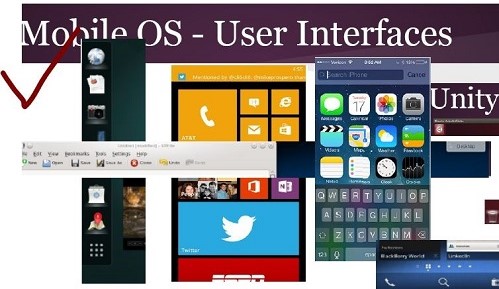Mobile device interfaces
Politis Dionysios
The purpose of this course is twofold: Primarily, attendants should become familiar with the wide use of all kinds of mobile devices, and secondly, they should become able to configure, design and program Interfaces that form the interaction with the mobile devices per se and the Internet.
To commit this, emphasis is given on:
- The theoretical approach for "metaphors" and "paradigms".
- The parameterization of mobile device interfaces.
- The learning of programming languages, entackled with rapid prototyping techniques that implement interactive models and "dialogues" according to theory.
Keywords: mobile, portable and wearable devices, interaction design, rapid prototyping, evaluation
ΛιγότεραThe purpose of this course is twofold: Primarily, attendants should become familiar with the wide use of all kinds of mobile devices, and secondly, they should become able to configure, design and program Interfaces that form the interaction with the mobile devices per se and the Internet.
To commit this, emphasis is given on:
- The theoretical approach for "metaphors" and "paradigms".
- The parameterization of mobile device interfaces.
- The learning of programming languages, entackled with rapid prototyping techniques that implement interactive models and "dialogues" according to theory.
Keywords: mobile, portable and wearable devices, interaction design, rapid prototyping, evaluation
The purpose of this course is twofold: Primarily, attendants should become familiar with the wide use of all kinds of mobile devices, and secondly, they should become able to configure, design and program Interfaces that form the interaction with the mobile devices per se and the Internet.
To commit this, emphasis is given on:
- The theoretical approach for "metaphors" and "paradigms".
- The parameterization of mobile device interfaces.
- The learning of programming languages, entackled with rapid prototyping techniques that implement interactive models and "dialogues" according to theory.
Keywords: mobile, portable and wearable devices, interaction design, rapid prototyping, evaluation
Περίγραμμα

Ομάδα στόχος
Computer Science students who are interested in developing multimedia applications in the field of mobile telephony, and in general within the telecommunications arena using smart, portable devices.
Διδάσκοντες
 Instructor: Dionysios Politis
Instructor: Dionysios Politis
Περιεχόμενο μαθήματος
- Introduction: Describing the interfaces and functions of a typical mobile system. Data input (keyboards, chord keyboards, phone pads, handwriting devices, "mouses", gyroscopes, physical control sensors, iDrives etc.) and output (multiple screens , large -large- screens , situated displays, dedicated displays, HDMI , DLNA, digital paper , etc. ). Interacting with portable devices. Network protocols enabling communication with peripheral devices and the Internet (wi-fi, bluetooth, radio link, electromagnetic & optical interfacing). The myth of the unbound evolution for mobile devices (infinitely fast machine). Ubiquitous devices, Networked Computing and Cloud Computing. Restrictions on interaction with portable devices.
- Specifying the interface elements: appearance, interaction, design. Identifying the user's data : behavioral aspects, liveness, dynamic interactions. Human factors and physiology. The law of Fitts.
- Designing the interface: Models, paradigms and metaphors that will replace the desktop metaphor of fixed computing systems. Rapid prototyping and design with script programming languages for context interaction: dialogue widgets, query interfaces, WIMP (= Windows, Icons, Menus, Pointers) interfaces, Script Programming Toolkits. Overall interaction framework customization with mobile devices and Interaction Paradigms for procedural language programming (Language versus Action).
- Programming the Interface: Basic programming principles in iOS, Android, and Windows8. Internet programming and applications (apps) for mobile devices.
- Educational Views for Mobile Interfaces: Multimodality, Computer Supported Cooperative Work, Social Networks using Mobile Devices, Ubiquitous Computing. Designing learning with mobile devices (m-learning).
Μαθησιακοί στόχοι
This course develops current and next-generation Interaction Technologies that allow students coming from diverse scientific fields to design and develop interactive applications for Mobile Devices. The Interfaces that are examined are used for Multimedia Learning, for Information Systems that promote e-learning, e-voting, applications in Medicine like prosthetics, cognitive systems, social media and many more. The use of smart mobile devices is promoted by designing Interfaces for such interoperability.
Προτεινόμενα συγγράμματα
- Love, S., Understanding Mobile Human-Computer Interaction, Elsevier-Butterworth-Heinemann, 2005
Μέθοδοι διδασκαλίας
This course applies a hybrid, blended learning model in a 70% - 30% ratio.
70% of the course material is presented in the form of ex-cathedra teaching in classes and in the laboratory. The attendants are required to present two literature based projects (bibliography projects) and demonstrate a prototype, based on programming languages and techniques for rapid prototyping.
30% of the teaching is offered via electronic media and includes:
- Video Lessons
- Electronic Tests (at least 2) using AUTh's VLE (MOODLE this year) @ http://elearning.auth.gr
- Electronic Submission of exercises and/or assignments
- Participation in the Fora and Wikis that AUTh offers over the Internet
Μέθοδοι αξιολόγησης
Projects: They are compulsory. They are presented in class and later on submitted via the VLE.
Extra Project on voluntary basis: For those who want to dip into Mobile Device Interfaces aiming to develop their BS thesis on this scientific area.
Προαπαιτούμενα
The knowledge of Human Computer Interaction, taught in pre-graduate level, is helpful, though it is not mandatory. The same goes for the prior experience in Rapid Prototyping with a script programming language.
Βιβλιογραφία
Bibliography
- Budiu, R., and Nielsen, J., Mobile Usability, New Riders Press, 2012.
- Smith, D., Friesen, J. , Android Recipes – A Problem-Solution Approach, Apress, N. York 2011.
- Hoober, S., Berkman, E., Designing Mobile Interfaces, O’Reilly, 2012.
- Allanwood, G., and Beare, P., User Experience Design, Fairchild Books, 2014.
Online readings
- F.L. Luo, Mobile Multimedia Broadcasting Standards Technology and Practice, SpringerLink (Online service), 2009
HEALINK
- J. Borchers, A Pattern Approach to Interaction Design, (Human Computer Interaction, Computer software – Development), e-Book, John Wiley and Sons, UK, 2001.
- K. Gramann, T.P. Jung, D. Ferris, C.T. Lin, S. Makeig, Towards a new Cognitive Neuroscience: Modeling Natural Brain Dynamics, Frontiers in Human Neuroscience, 2014.
Library
- L. Jordan, P. Greyling, Practical Android Projects, Apress, Berkeley, CA, 2011.
- Z. Mednieks, Programming Android, O’Reilly, 2012
- J.F. DiMartzio, Androis: a programmer’s guide, McGraw-Hill, 2008.
Articles
- Politis,D., Piskas,G., Tsalighopoulos, M., Kyriafinis,G., variPiano™: Visualizing Musical Diversity with a Differential Tuning Mobile Interface, International Journal of Interactive Mobile Technologies, Vol. 9, No. 3, July 2015.
- Politis, D., Margounakis, D., Aspiotis, V, Nakou, D., Kefalas, T., Mobile Music Interfaces Evaluation, Encyclopedia of Information Science and Technology, Publisher: IGI Global, Third Edition, 2015.
- Karakostas, A., A pilot study of Quizit: The new android classroom response system, 2014 International Conference on Interactive Mobile Communication Technologies and Learning, IMCL 2014, Thesaloniki, 13-14/11/2014, IEEE proceedings, pp. 147-151.
Computer Science students who are interested in developing multimedia applications in the field of mobile telephony, and in general within the telecommunications arena using smart, portable devices.
 Instructor: Dionysios Politis
Instructor: Dionysios Politis
- Introduction: Describing the interfaces and functions of a typical mobile system. Data input (keyboards, chord keyboards, phone pads, handwriting devices, "mouses", gyroscopes, physical control sensors, iDrives etc.) and output (multiple screens , large -large- screens , situated displays, dedicated displays, HDMI , DLNA, digital paper , etc. ). Interacting with portable devices. Network protocols enabling communication with peripheral devices and the Internet (wi-fi, bluetooth, radio link, electromagnetic & optical interfacing). The myth of the unbound evolution for mobile devices (infinitely fast machine). Ubiquitous devices, Networked Computing and Cloud Computing. Restrictions on interaction with portable devices.
- Specifying the interface elements: appearance, interaction, design. Identifying the user's data : behavioral aspects, liveness, dynamic interactions. Human factors and physiology. The law of Fitts.
- Designing the interface: Models, paradigms and metaphors that will replace the desktop metaphor of fixed computing systems. Rapid prototyping and design with script programming languages for context interaction: dialogue widgets, query interfaces, WIMP (= Windows, Icons, Menus, Pointers) interfaces, Script Programming Toolkits. Overall interaction framework customization with mobile devices and Interaction Paradigms for procedural language programming (Language versus Action).
- Programming the Interface: Basic programming principles in iOS, Android, and Windows8. Internet programming and applications (apps) for mobile devices.
- Educational Views for Mobile Interfaces: Multimodality, Computer Supported Cooperative Work, Social Networks using Mobile Devices, Ubiquitous Computing. Designing learning with mobile devices (m-learning).
This course develops current and next-generation Interaction Technologies that allow students coming from diverse scientific fields to design and develop interactive applications for Mobile Devices. The Interfaces that are examined are used for Multimedia Learning, for Information Systems that promote e-learning, e-voting, applications in Medicine like prosthetics, cognitive systems, social media and many more. The use of smart mobile devices is promoted by designing Interfaces for such interoperability.
- Love, S., Understanding Mobile Human-Computer Interaction, Elsevier-Butterworth-Heinemann, 2005
This course applies a hybrid, blended learning model in a 70% - 30% ratio.
70% of the course material is presented in the form of ex-cathedra teaching in classes and in the laboratory. The attendants are required to present two literature based projects (bibliography projects) and demonstrate a prototype, based on programming languages and techniques for rapid prototyping.
30% of the teaching is offered via electronic media and includes:
- Video Lessons
- Electronic Tests (at least 2) using AUTh's VLE (MOODLE this year) @ http://elearning.auth.gr
- Electronic Submission of exercises and/or assignments
- Participation in the Fora and Wikis that AUTh offers over the Internet
Projects: They are compulsory. They are presented in class and later on submitted via the VLE.
Extra Project on voluntary basis: For those who want to dip into Mobile Device Interfaces aiming to develop their BS thesis on this scientific area.
The knowledge of Human Computer Interaction, taught in pre-graduate level, is helpful, though it is not mandatory. The same goes for the prior experience in Rapid Prototyping with a script programming language.
Bibliography
- Budiu, R., and Nielsen, J., Mobile Usability, New Riders Press, 2012.
- Smith, D., Friesen, J. , Android Recipes – A Problem-Solution Approach, Apress, N. York 2011.
- Hoober, S., Berkman, E., Designing Mobile Interfaces, O’Reilly, 2012.
- Allanwood, G., and Beare, P., User Experience Design, Fairchild Books, 2014.
Online readings
- F.L. Luo, Mobile Multimedia Broadcasting Standards Technology and Practice, SpringerLink (Online service), 2009
HEALINK
- J. Borchers, A Pattern Approach to Interaction Design, (Human Computer Interaction, Computer software – Development), e-Book, John Wiley and Sons, UK, 2001.
- K. Gramann, T.P. Jung, D. Ferris, C.T. Lin, S. Makeig, Towards a new Cognitive Neuroscience: Modeling Natural Brain Dynamics, Frontiers in Human Neuroscience, 2014.
Library
- L. Jordan, P. Greyling, Practical Android Projects, Apress, Berkeley, CA, 2011.
- Z. Mednieks, Programming Android, O’Reilly, 2012
- J.F. DiMartzio, Androis: a programmer’s guide, McGraw-Hill, 2008.
Articles
- Politis,D., Piskas,G., Tsalighopoulos, M., Kyriafinis,G., variPiano™: Visualizing Musical Diversity with a Differential Tuning Mobile Interface, International Journal of Interactive Mobile Technologies, Vol. 9, No. 3, July 2015.
- Politis, D., Margounakis, D., Aspiotis, V, Nakou, D., Kefalas, T., Mobile Music Interfaces Evaluation, Encyclopedia of Information Science and Technology, Publisher: IGI Global, Third Edition, 2015.
- Karakostas, A., A pilot study of Quizit: The new android classroom response system, 2014 International Conference on Interactive Mobile Communication Technologies and Learning, IMCL 2014, Thesaloniki, 13-14/11/2014, IEEE proceedings, pp. 147-151.
Keywords: introduction
Keywords: HCI, mobile device interfaces
Keywords: design principles, instrumentation, mobile interfaces
Keywords: mobile interface, multimedia technologies
Keywords: communication, future
Keywords: interactive learning platforms, WizIQ paradigm
Ανοικτό Ακαδ. Μάθημα

Αρ. Επισκέψεων : 3655
Αρ. Προβολών : 21511

